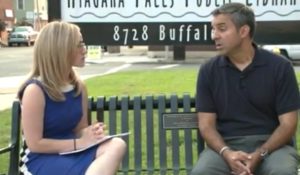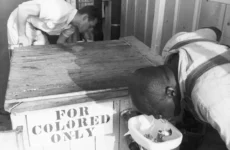Change is in the air, and last week’s primary election provided evidence of it.
In a stunning turn of events, a complete political outsider, Bill Kennedy, came in a solid second in the Democratic race for three open seats on City Council, a mere 28 votes behind frontrunner Andrew Tuoma. Trailing the two by a wide margin, incumbent Kristen Grandinetti squeaked past strong challenges by two other newcomers, Lakea Perry and Amber Hill-Donhauser, placing a relatively distant third behind Mr. Touma and Mr. Kennedy.
The three will face Republicans Sam Archie, Robert Pascoal and Chris Voccio in November’s general election.
Interestingly, two of the winning three, Mr. Pascoal and Mr. Voccio, moved here just a few years ago, got involved in the fabric of the community, looked around and, drawing on experience gained in the world outside of Niagara Falls, which has the highest rates of unemployment, and violent and property crime of any city in all of New York State, and among the highest rates of taxation and childhood poverty, and recently had its credit rating downgraded to near-junk status, came to believe that “change” could be more than just a buzzword, and they could be the instruments of it.
Four years ago, Mr. Touma won the Democratic primary with 2,310 votes, or 29.71% of the total cast, while Ms. Grandinetti came in at a convincing 1,832 votes, or 23.57% of those cast, besting fourth place finisher Sam Fruscione by more than 400 votes.
This time around, their numbers sank to 1,784 (23.9%) and 1,457 (19.5%), respectively, while voter turn-out last week was near identical to what it was four years ago, 7477 as compared to 7774 in 2013 (a less than 1% difference). This steep drop in support, ceding nearly 60% of the vote to their challengers, clearly signifies a trend and a desire for change.
Not to mention the fact that the only “challenger,” so to speak, back in 2013 was Mr. Touma. The other three (Walker, Grandinetti and Fruscione) were incumbents, and together were the only four on the ballot.
On the other hand, last week’s Democratic primary was characterized by more challengers than incumbents.
The primary results could be considered partly a referendum on the performance and policies of Mayor Paul Dyster, since Councilmembers Touma and Grandinetti are known to be close allies of the mayor, consistently voting in favor of his agenda, policies and priorities.
And after ten years in office, Mayor Dyster’s record in terms of accomplishment is there for all to see. You either think he’s doing a great job, or you think he’s doing a lousy job. Or maybe you don’t care either way, since he steered some business your way or just gave your brother, who works for the city, a raise.
His overall strategy, which Mr. Touma and Ms. Grandinetti enthusiastically support, is to acquiesce to anything and everything Gov. Cuomo, the governor’s campaign contributors, and Albany and Buffalo big interests have in mind for the city of Niagara Falls. Because, of course, they have our best interests at heart.
In return for the mayor’s unceasing loyalty, the governor comes here once in a while to cut a ribbon on a new, state-subsidized box hotel. Meanwhile, never is heard a discouraging word from the mayor or his two confederates on the Council as the state diverts tens of millions of dollars from Niagara Falls State Park and the Niagara Power Project from the city to the state.
For example, as part of a report on Niagara Falls’ desperate fiscal condition, WGRZ-TV’s Erica Brecher interviewed Councilman Touma on a bench in front of the LaSalle Public Library late last week, questioning him on a raise and other increased benefits, ultimately approved in a 4-1 Council vote on Monday, for exempt city employees, in the context of disappearing casino funds.
The interview was going smoothly when Ms. Brecher suddenly asked, “What right now in the city of Niagara Falls can you rely on to be revenue generating?”
Councilman Touma, who to this point had not taken his eyes off Ms. Brecher, suddenly averted his gaze to the nearby flower garden, then the traffic proceeding along Buffalo Avenue, as he stammered out, “Well… certainly… umm… we rely on… uh… the state… I mean, we, we… the state aid is… is around 19 million dollars. The unfortunate thing is, Erica, is that hasn’t changed in seven or eight years. We’ve created more parking revenue in the last three years than we’ve had in the last ten or fifteen years. Three years ago we were averaging a half a million dollars in parking revenue, now it’s $1.2 million.” So, according to Mr. Touma, it’s parking revenue that’s going to reverse the city’s financial fortunes.
Mr. Touma also pointed out to Ms. Brecher that Niagara Falls is the “host city” to both the Niagara Parks Commission and the Bridge Commission and that “maybe it’s time to ask those groups for a larger share of their revenue.”
One problem with that, is that the Bridge Commission is headquartered not in Niagara Falls, but in Lewiston.
Another problem is that it isn’t the Niagara Parks Commission, it’s Niagara Falls State Park that generates $20 million a year for the state from parking, food service and assorted fees.
A third coloring of the truth in Mr. Touma’s statement to the TV interviewer is that, as opposed to a “larger share,” the city of Niagara Falls gets zero, nada, nothing in terms of revenue sharing from either the Bridge Commission or the Office of State Parks.




















